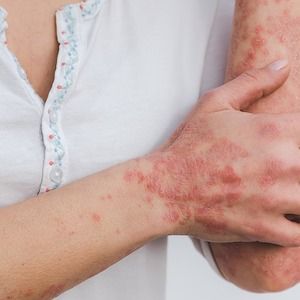Article
Study Finds Increased Risk of Psoriasis for Patients with Herpes Zoster
Author(s):
A population-based cohort study found patients with shingles to have a greater likelihood of developing psoriasis than the control group.

Patients with a diagnosis of herpes zoster, or ‘shingles,’ were found to have an almost 1.66 times higher risk of developing psoriasis than the control arm in a recent study.
This study was led by Yu-Wen Chen, MD, from Taichung Veterans General Hospital in Taiwan, using patient data from the Taiwan National Health Insurance Research Database.
In several prior observational studies of patients with psoriasis being given methotrexate and biologic therapy, these patients were shown to be at a higher risk for developing herpes zoster.
“Psoriasis itself also showed an increased risk for its patients to encounter herpes zoster reactivation,” Chen and colleagues wrote. “On the other hand, several case reports found herpes zoster or primary varicella to induce various subtypes of psoriasis, stirring discussions on whether herpes zoster influenced the risk of psoriasis development.
The main goal of this study was stated to be assessing psoriasis risk association in patients diagnosed with herpes zoster.
Background
The investigators drew data from the Taiwan National Health Insurance Research Database, using 26,623 patients in total. The information gathered came from the period of 1999 to 2013, with the investigators assessing patients with herpes zoster and without a history of psoriasis.
They used a control group in the same study period without a herpes zoster diagnosis, with a propensity score match so that confounding variables were limited. Each study arm was followed to report cases of psoriasis development in the patients.
The investigators made sure to report diagnoses accurately by having patient diagnoses of psoriasis being included from a single inpatient admission or 2 outpatient visits within a single year. They also gathered data on comorbid medical disorders in the patients being examined, using inpatient and outpatient records from the National Health Insurance program (NHI) in Taiwan.
Results
The study results demonstrated that, when comparing the control arm to the study arm, the adjusted hazard ratio was noted as 1.66 (95% CI, 1.31–2.13: P < 0.05), following an adjustment for covariates such as age, gender, etc.
The researchers’ analysis reported no interaction effect among herpes zoster and other noted covariates for risk modification of the development of psoriasis, despite several factors showing statistical significance individually.
The investigators noted that all instances of reported psoriasis found the skin disease to appear in the same places as the patients’ cutaneous lesions resulting from herpes zoster. This localization provides a notable basis for the researchers’ association between the 2 conditions.
“We reviewed and discussed proposed mechanisms in literature, including neuroimmune modulations, upregulation of inflammatory cytokines and Th17 cells,” they wrote. “Our study underscores a growing literature on infection-provoked psoriasis and brings the increased risk of psoriasis following herpes zoster infection to clinicians' attention.”
The study, “Increased risk of psoriasis: An immune sequela of herpes zoster? Evidence from a nationwide population-based cohort study,” was published online in the Australasian Journal of Dermatology.





